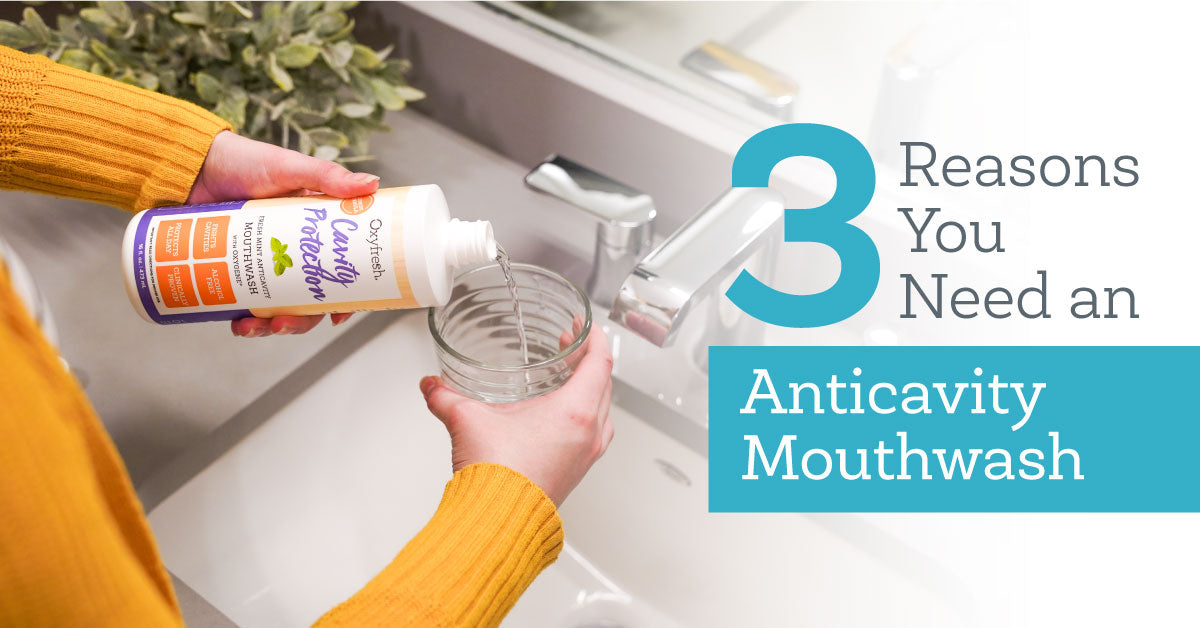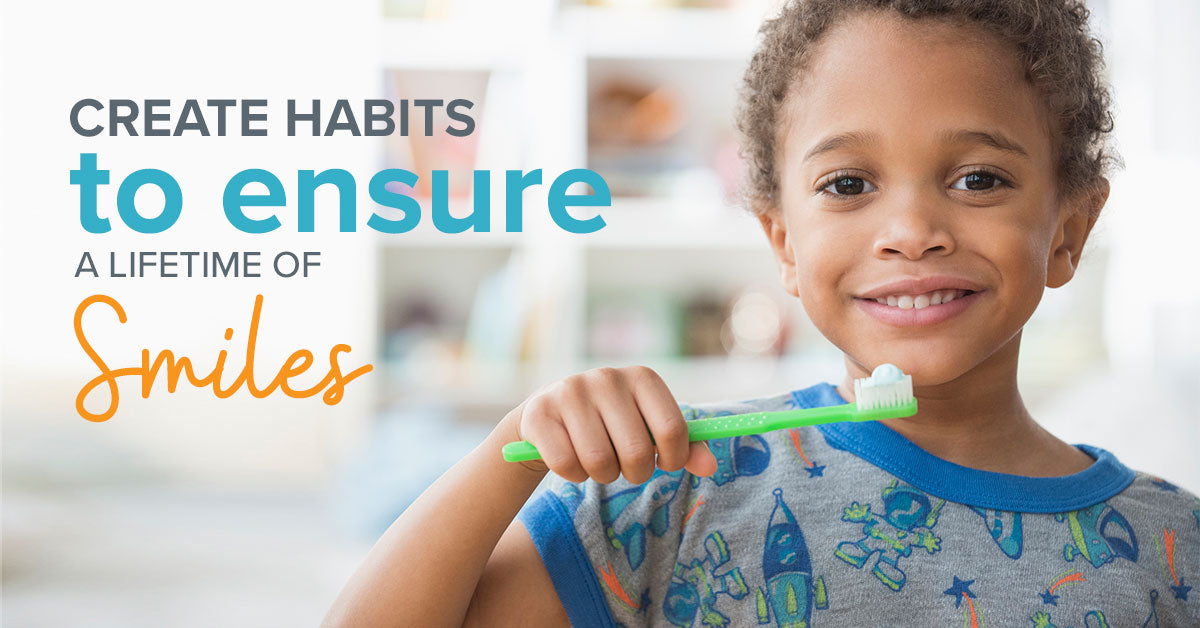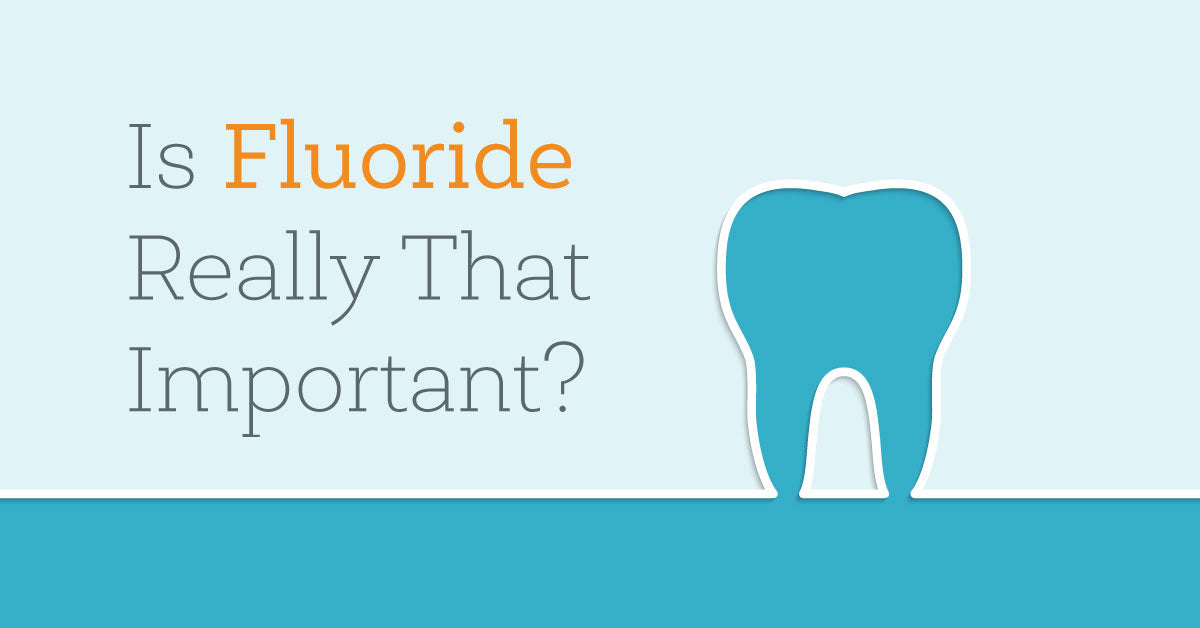Hearing the words “you have a cavity” can definitely be a frowner – er, a downer. No one likes to fork out money for fillings, but it is a necessity. Decay that goes untreated will just spread and cause more serious problems down the road, such as cracked and broken teeth … way more expensive to fix than treating cavities!
Here’s the good news: it’s never too late to take better care of your smile. One of the best ways to do this is by adding a sodium fluoride mouthwash to your daily dental routine. There are so many fluoride mouthwash benefits beyond just cavity protection! Keep reading to learn what they are and the three reasons you need an anticavity mouthwash.
Why You Need an Anticavity Mouthwash
#1. Your Teeth Are Susceptible to Acid
Mom told us it was “sugar bugs,” but really – how do cavities happen?
In a nutshell: ACID.
Cavities occur when sticky plaque and bacteria build up on the teeth and gums. Plaque creates acid. Acid erodes the enamel of our teeth, weakening it and making us susceptible to decay and cavities.
It’s hard to stop these acid attacks, especially when our diets aren’t always helping the situation. We tend to just think of sugar and soda as the cause of decay, but in reality, many other seemingly innocent beverages can cause an abundance of acid – yes, even sugar-free soft drinks and those fizzy waters that are all the rage. Anything with carbonation will be acidic!
Drinks high in acid:
- Lemon juice
- Soda
- Powdered fruit drinks
- Sports drinks
- Flavored teas
- Flavored waters
- Apple juice
- Orange juice
Enjoying these drinks as treats instead of everyday must-haves will go a long way in protecting your enamel from acid erosion.
Food for thought: when you have candy, choose wisely! According to mouthhealthy.org, certain sour candies are as acidic as battery acid. (Gulp.)
When you do indulge in acidic drinks and even acidic foods (think citrus fruits and tomatoes), you can stop the acid attack by taking some simple steps.
How to help combat acid attacks on your teeth:
- Rinse with water right away after having something acidic
- Don’t swish acidic drinks around in your mouth – just sip and swallow
- Wait at least 30 minutes before brushing so that you don’t “brush” the acid into your enamel
- A straw is a good option if you want to limit your teeth’s exposure to acid as much as possible (check out these eco-friendly plastic straw alternatives)
- Rinse each day with a mouthwash for cavities – it will help remineralize your teeth and make them more resistant to acid
How does fluoride protect us from cavities?
Fluoride is a naturally occurring element found in water, soil, plants, rocks, and even certain foods, such as spinach, potatoes and grapes.
Each day minerals are lost and added to the enamel layer of our teeth, including through our diets and dental products. When there’s an imbalance, decay begins – and it doesn’t affect just kids!
Did you know that 20% of kids ages 5–11 have at least one untreated cavity, according to the CDC? And that percentage is even higher for adults at over 25%.
Fortunately, fluoride can help protect our teeth and even reverse the early signs of decay.
Fluoride works by restoring minerals to tooth surfaces where bacteria may have eroded the enamel. It also helps stop the growth of harmful bacteria, which helps prevent further cavities from forming by making our teeth stronger against acid attacks.
Using a mouthwash for cavities each day is a smart choice because it’s an easy way to help remineralize your enamel and get to the spots you may have missed with your toothbrush – and at the same time, you get fresh breath!
But don’t think “I use a mouthwash for cavities so I don’t have to do much else with my teeth.” While it will definitely give you an advantage in cavity protection, you’ll still want to brush 2x daily, follow a healthy diet, keep your regular dental appointments, avoid excessive alcohol use, and just say no to drugs.
#2. You Have Sensitive Teeth
If you have tooth sensitivity, then you know it’s no joke. Most people don’t think twice about enjoying an ice cream cone on a warm summer day or sipping a hot cup of coffee after a winter walk. But for those of us with tooth sensitivity, these seemingly inconsequential activities can have BIG consequences – the sudden, sharp pain of tooth sensitivity.
Sometimes, tooth sensitivity is so bad that even just breathing in cold air can give us that “nails on a chalkboard” cringe-like feeling.
How does tooth sensitivity occur?
Tooth sensitivity occurs when the tooth’s dentin is exposed. Dentin contains tubules, microscopic channels that travel from the underside of the enamel surface to the inside of the tooth, called the pulp. Exposed dentin can be caused by worn enamel or when the cementum, the layer covering the root, is exposed along the gum line due to receding gums.

If you have tooth sensitivity, you’ll want to make an appointment with your dentist to discover the WHY behind it.
Common causes of tooth sensitivity:
- Your bite is “off”
- Broken or chipped teeth
- Worn-down fillings or crowns
- Dental decay – inflamed gum tissue can pull away from the teeth, exposing sensitive areas
- Gum recession
- Teeth grinding or clenching
- High-acid food and drinks in your diet
- Health conditions like GERD (gastroesophageal reflux) or bulimia
Tooth sensitivity can even be caused by the dental products you’re using.
Toothbrush.
What kind of toothbrush bristles do you prefer? If you regularly use a medium- or hard-bristle toothbrush, you could be wearing away your enamel.
Think about how most people brush their teeth – with a vigorous, back-and-forth brushing motion. More force equals cleaner teeth, right? Eek. In reality, forceful brushing only serves to wear away our enamel, exposing more of the sensitive dentin underneath. Soft- or ultra-soft bristled brushes are best. And getting into the habit of brushing with gentle, circular motions can do wonders for your smile. No scrubbing – our teeth are not like tiles in the shower!
Toothpaste.
Another dental product that could be contributing to your tooth sensitivity is your toothpaste. Many brands are too abrasive – think of abrasiveness as “scrubbing power.” In general, toothpastes that are touted as “whitening formulas” are the most abrasive.
If your toothpaste is too abrasive AND you brush like it’s a strength contest, then it’s a double whammy against your enamel. Our teeth are not high maintenance! Gentle brushing with a gentle fluoride toothpaste can get your teeth clean while protecting your delicate enamel and helping to desensitize.
Sometimes, tooth sensitivity may just be a temporary phenomenon.
Tooth sensitivity is quite common after having certain dental work performed, especially teeth whitening. Sensitivity after teeth whitening will usually go away after 1– 3 weeks. However, if you ALREADY have sensitive teeth and then pile whitening on top of that, your sensitivity may be more severe and you’ll want to be aware of tips to decrease those sharp sensations.
Ways to help your teeth sensitivity:
- Use a soft- or ultra-soft toothbrush
- Brush with a low abrasion toothpaste with fluoride – avoid whitening and “stain removing” formulas
- Get help if you grind or clench your teeth at night
- Swish with a fluoride mouthwash each day
One of the best fluoride mouthwash benefits is how it helps desensitize enamel.
Enamel, the hard outer layer of the tooth, provides a protective layer between the sensitive root and nerves within the mouth. Fluoride can help strengthen and even rebuild some lost enamel. And when used as a mouthwash, it will quickly and efficiently coat your teeth, helping to desensitize with every swish.
A word on dental guards and tooth sensitivity …
While it may be tempting to go the OTC route, it’s truly best to have a dentist fit you with a custom mouth guard if you grind your teeth at night or clench them. This will protect your bite, give you a customized solution, and make sure an existing problem doesn’t get worse.
For example, if you have sensitive teeth from clenching and not grinding, then a soft plastic OTC guard can be the equivalent of chewing on gum all night. Because so many teeth clenchers wake up with jaw pain and headaches in the morning, an OTC guard can make it worse.
And if you’re a strong grinder or clencher, many people report chewing the guard down and swallowing plastic. No thank you.
A custom mouth guard will likely run a couple hundred dollars (insurance probably won’t cover), but if the alternative is paying to fix chipped teeth or cracked dental work, it may just be the best money you ever spend!
#3. You Have Dry Mouth
Dry mouth (xerostomia) is exactly what it sounds like – the mouth is dry and isn’t producing enough saliva. In addition to causing discomfort to where it’s hard to swallow and eat, dry mouth is a leading cause of tooth decay. That’s because saliva is our body’s natural way of fighting bacteria.
Common causes of dry mouth:
- Medications – over 400 prescribed and OTC medications can cause dry mouth.
- Stress or Illness – stress can affect our body in many mysterious ways, including giving us dry mouth. Likewise, certain illnesses or infections can slow our saliva flow.
- Too much alcohol or coffee consumption – cut back on these beverages and see if it makes a difference in your saliva production.
- Age – our saliva flow unfortunately does not get better with age. For seniors and women going through menopause, it can be an uncomfortable problem for sure.
- Alcohol-based mouthwashes – Alcohol dries out the mouth, and because it burns and stings, it definitely will not feel good on dry tissue in the mouth.
To help fight the decay that often accompanies dry mouth, rinse with an alcohol-free fluoride mouthwash. And be sure to speak with your doctor about ongoing issues with dry mouth. Oftentimes, a switch in medications can be all it takes to help with the problem.
What Is the Best Anticavity Mouthwash?
Oxyfresh Cavity Protection Mouthwash checks all the boxes when it comes to fluoride mouthwash benefits. But it’s so much more than that! Here are 6 ways our unique formula stands out from other mouthwashes with fluoride.
#1. It’s alcohol free
Did you know that a typical store-brand mouthwash can have an alcohol content as high as 26.9%? This is a problem for a few reasons:
It can burn and sting. A home dental routine should not be painful!
It creates even worse bad breath. Sad, but true. Even though alcohol will initially eliminate the “bad breath germs,” it quickly creates even more. How is this possible? Alcohol is a drying agent. Bad breath-causing bacteria absolutely thrive in a dry environment. It produces more and more bacteria, creating a vicious cycle of rinsing to get rid of it. Remember – dry mouth is a leading cause of bad breath!
It can harm your gum tissue. Alcohol-based mouthwash can damage the cells in your gum and cheek tissues. As the cells slough off, they become food for the bacteria that cause bad breath, contributing to a worsened halitosis situation.
#2. It’s a sodium fluoride mouthwash
While other anticavity mouthwashes often use stannous fluoride, which can cause yellow teeth stains, the Oxyfresh formula is a neutral sodium fluoride mouthwash. That means it gives you the ultimate cavity protection without compromising your pearly white smile.
#3. It’s free of dyes
Speaking of pearly whites, if you want to keep yours, run from those colorful blue and green mouthwash bottles that you see on store shelves. Along with alcohol, their cocktail of ingredients includes dyes. Swishing with dyes for 30–60 seconds once or twice a day is a no-go for your bright smile. Being a 100% dye-free sodium fluoride mouthwash is yet another reason to choose Oxyfresh Cavity Protection Mouthwash.
#4. It contains Oxygene®
Rather than alcohol to banish bad breath germs, Oxyfresh’s anticavity mouthwash contains our exclusive Oxygene® ingredient. Oxygene® is stabilized chlorine dioxide. Don’t let the word “chlorine” turn you off … it is NOT bleach and definitely not the stuff you dump into swimming pools.
Chlorine dioxide has long been used to purify public drinking water. It’s brilliant because it’s an oxidizer. It eliminates bacteria that can lead to health problems – and in the case of dentistry, that means stopping plaque buildup and bad breath. Chlorine dioxide is safe, effective, proven for its effectiveness, and trusted by dentists.
#5. It’s formulated with natural essential oil
Safe and natural essential peppermint oil will leave your mouth feeling completely fresh and clean without an aftertaste. It also helps soothe irritations and helps moisten the mouth.
#6. It contain Xylitol, a natural sweetener
For even more cavity fighting protection, Oxyfresh Cavity Protection Mouthwash is naturally sweetened with xylitol. This plant-based sweetener is shown to help inhibit plaque buildup, as well as the bacteria implicated in tooth decay. Less plaque and bacteria mean less of a chance of cavities.
Check Out Oxyfresh Anticavity Mouthwash Reviews
Never Had a Cavity!
Oxyfresh fluoride mouthwash not only prevents cavities but keeps your mouth fresh all day. I have been using it for 20 years and I have never had a cavity.
– Barbara B.
Help for My Sensitive Teeth!
My teeth are sensitive to hot and cold liquids, but when I use Oxyfresh Fluoride Mouthwash, my teeth aren’t nearly as sensitive. It’s a bonus that it keeps my breath fresh!
– Bekka S.
No Cavities in 20 Years!
I haven’t had a cavity in 20 years, and my gums are so much healthier now. Before I started using Oxyfresh Cavity Protection Mouthwash and toothpaste, I had the beginnings of periodontal disease.
–Sandra A.
Love the Taste!
I love the taste of Oxyfresh Fluoride Mouthwash. It’s not too strong and doesn’t burn your mouth like other products out there.
– Mary L.
Dentists Notice the Difference!
I have used the Oxyfresh Fresh Mint Fluoride Mouthwash since 2001. I have always gotten comments about how white my teeth look & how great a job I am doing taking care of my teeth from the dentist offices I have gone to.
–Jan S.
Fluoride mouthwash benefits are wholeheartedly supported by the dental community, yet not everyone will choose to use fluoride when it comes to their personal dental care. That’s OK. Just head on over to oxyfresh.com – we have 5 unique mouthwash formulas to choose from, including fluoride-free options, so you can find the one that’s just right for you.




